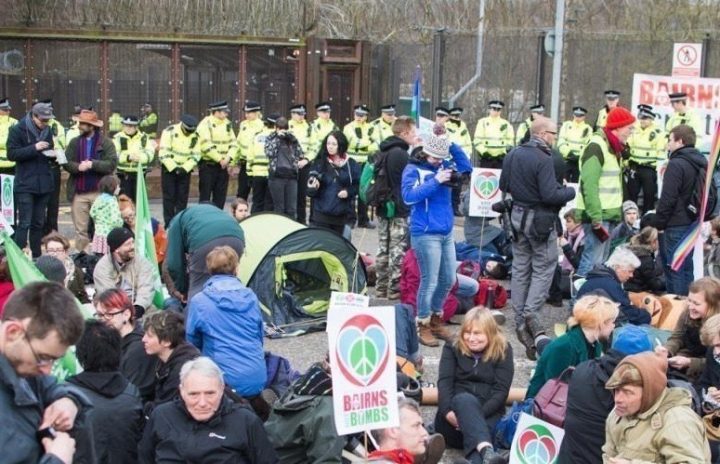The Greenham Common peace camp and other 1980s anti-nuclear activists made a real difference – now a stronger tide is with the climate protestors.

This week’s Extinction Rebellion actions in London have produced some notable headlines, one being the Daily Mail’s “Extinction Rebellion mothers stage mass breastfeeding after police escort children and their buggies along Whitehall”. On a more political front The Daily Telegraph had the writer Julie Burchill under the headline “What must Hongkongers think of Britain’s privileged eco whingers?”, but perhaps the most unexpected contribution, at least for the Mail, was Janet Street-Porter’s “Never mind the nose-rings, Boris, a lot of these climate-change protestors are your people, and they have a point”.
She is pointing to one of the most striking aspect of the XR phenomenon: the sheer range of people who have been suddenly and determinedly motivated to act, even facing the risk of arrest. You have to go back a long way in the UK to find a comparable example.
One happened forty years ago, when Margaret Thatcher was elected prime minister in the UK, with Ronald Reagan following as president in the US a year later. We were entering a new and highly dangerous phase of the Cold War, not least in the UK, where the decision to upgrade the country’s missile submarine force and to allow the US to base ground-launched cruise missiles at the Royal Air Force’s Greenham Common and Molesworth bases caused immediate controversy and reawakened the anti-nuclear movement.
If one specific act helped stimulate this, it was the publication of ‘Protect and Survive’, an extraordinarily complacent civil defence pamphlet from the Home Office that confidently described how a bit of simple do-it-yourself could protect a typical home in a nuclear war. It came out in May 1980; a few months later the historian E. P. Thompson published a trenchant dissection of its laughable optimism called ‘Protest and Survive’. He then embarked on a lecture tour on the issue of what he called nuclear ‘exterminism’ and the reaction was extraordinary.
When he came to Bradford the organisers thought they might get a couple of hundred people turn up, even if the nuclear issue had been dormant for a decade, so they booked a hall with that capacity. Half an hour before the talk was due to start the hall was already packed, another 200 people were queuing in the street and a score or more arriving every minute. Fortunately, the minister of the nearby Methodist Hall was there and promptly opened it for the 700-plus people who turned up. Public reaction was not dissimilar elsewhere.
Burn-out
‘Protest and Survive’ was a marker for an upsurge which led to many actions, most notably the multi-year women’s peace camps at Greenham Common. There are valid reasons for arguing that these protests and their numerous counterparts in other countries helped form the political environment in which the key Intermediate Nuclear Forces treaty of 1987 could be signed. Even so, many activists were exhausted by the mid-1980s, well before the end of the Cold War.
Will XR campaigners get similarly worn out? Perhaps, but there are also good reasons to think that their aims will become more and more accepted and that rapid change will come.
For a start, awareness of the problem of climate change is spreading across a wider swathe of society than the 1980s anti-nuclear revival reached and it is attracting proportionally far more young people. Another factor is the awareness of the power of non-violent action, present then but even more evident now. More generally there is a clear determination across the XR movement to stick with it and avoid getting steered into violence or division.
There are three wider issues as well. One is that the climate is changing ever more rapidly and so reports on the need to counter this breakdown are coming out at least weekly. This means that XR supporters get constant reminders that they are right to persist, whatever the obstacles.
The second issue is that there is a surge in knowledge and understanding about the underlying causes of climate change, which enables climate scientists and others to be more confident in their predictions.
Finally, there have been seriously impressive developments in the technologies and processes of radical decarbonisation. The exploitation of solar energy and wind power has become so much more efficient and cheaper than even a decade ago and there is every possibility of major improvements in storage and distribution.
Politics catching up
The problem, as ever, is the political will to take the action. Here too, however, there has been a transformation. Apart from the Green Party, which has been there all along, Scottish and Welsh nationalists are both advocating far stronger policies on decarbonisation, as are the Lib Dems. But what tends to be forgotten is the change in the Labour Party.
Its record has not been all bad. During the Blair and Brown years there were some good initiatives, if often too little and late, and some Labour politicians kept the pressure up during the 2010-15 coalition years. It is the more recent transformation that has caught people by surprise, though, even if John McDonnell, Rebecca Long-Bailey, Clive Lewis and others have long been pushing for radical change. At its recent party conference, Labour adopted a 2030 target for transitioning to ‘zero carbon’ in the UK. This was far stronger than most political analysts expected, and it is very likely that this will be embedded in its election manifesto in a few weeks. If that happens, XR can take a lot of the credit.
What this means is that there is a serious possibility that in the forthcoming general election, even if there is another minority government, there will be a majority in Parliament for radical decarbonisation. That really will be a change, and much more important in the long run than Brexit.
About the Author
Paul Rogers is Emeritus Professor of Peace Studies at the University of Bradford and Global Security Consultant with Oxford Research Group (ORG)










